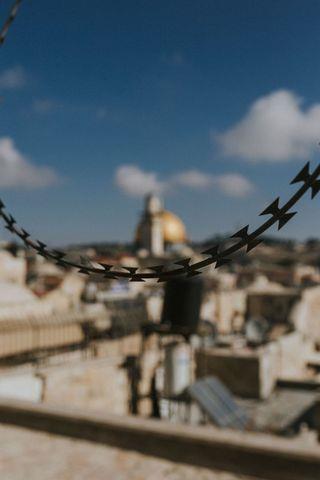Grace Al-Zoughbi’s family’s tradition is to go to Jerusalem on Palm Sunday and walk in the footsteps of Jesus starting from Bethphage to the Mount of Olives. She shares why it is so important to retrace his footsteps during this season.

It is significant to me, beyond words, to be born and live in the land where the Lord Jesus himself was born, lived, died and rose on the third day. The Easter season reminds me that Christ defeated the power of death more than two thousand years ago, but he lives today in me.
His resurrection means I have a calling to serve our risen Lord with all that I have, all that I can, wherever I can. I feel strongly called to serve my people in the Middle East. Despite the ongoing injustices and hardships in the land where Christ lived, his love and peace will ultimately reign through us, his witnesses.
The apostle Peter reminds us in 1 Peter 1:3, “Praise be to the God and Father of our Lord Jesus Christ! In His great mercy, He has given us new birth into a living hope through the resurrection of Jesus Christ from the dead.” It is this hope that we cling to, that we preach and that we live for!
In my community, remembering the resurrection of Christ where it originally took place posits the Easter story in its authentic context.
In my community, remembering the resurrection of Christ where it originally took place posits the Easter story in its authentic context.
How can we not believe in the death and resurrection of Christ when it took place in our very city, in our homeland, in the birthplace of Christianity?
How can we not receive his love when we experience his provision in our life day by day? To the Palestinian Christians, Jesus is the same, yesterday, today and forever.
Before Jesus walked to the cross, he entered Jerusalem on a donkey. My family’s tradition, like many here, is to go to Jerusalem on Palm Sunday and walk in the footsteps of Jesus starting from Bethphage to the Mount of Olives.
A significant parade takes place every year on Palm Sunday where Christians from various ecclesial expressions in the Holy Land shout, “Hosanna in the highest…Blessed is he who comes in the name of the Lord.”
I live five miles from Jerusalem. Sadly, Bethlehem and Jerusalem, the two neighbouring towns, are separated by a gigantic cement wall due to ongoing political tensions.
I live five miles from Jerusalem. Sadly, Bethlehem and Jerusalem, the two neighbouring towns, are separated by a gigantic cement wall due to ongoing political tensions. Yet, during the Easter period, some of the Christians in the West Bank are usually permitted to visit the city next door, across the wall; across the checkpoints. A special tradition that is practised in our culture is walking the Via Dolorosa in Jerusalem, more commonly known as “The Way of the Cross” (Via Cruxis). Also known as the “way of suffering”, this is believed to be the last walk Jesus took when he was carrying the very cross on which he would be crucified. Whilst you can walk this road any time of the year, locals and pilgrims alike experience its particular significance around Easter time, retracing the steps Jesus took in Jerusalem.
On my way to Jerusalem, as I venture through the checkpoints and enter the ancient city, I wonder if Jesus would still be sad for Jerusalem. I also wonder what is it that he sees as he gazes at the city today? What grieves his compassionate heart? Are there people still shouting, “Crucify him!”? Are there people who are renouncing his Kingdom and Kingship? Jerusalem was the site of the greatest victory ever achieved; the city where evil was overcome, death defeated, injustice conquered and the forces of darkness chained. None of this would have taken place if it wasn’t for the cross. And yet, how often we forget to boast in the power of the cross!
About a half-mile along the Via Dolorosa you would encounter the 14 “Stations of the Cross”, leading to the Church of the Holy Sepulchre, where traditionally Jesus was buried. These sites witness to the amazing life of Jesus, his death and resurrection. However, wherever we are in the world, we can walk the narrow path Jesus walked so that we too can be living witnesses and living stones for the Lord.
But in reality, what is it that we are we proclaiming in our hearts, in our ways, in our thoughts, in our actions? “Hosanna in the Highest”? “Save us Son of David”? Whilst massive crowds shouted Hosanna two thousand years ago, more likely yearning for political restoration, we are reminded to keep our eyes focused on Jesus, the author and finisher of our faith.
For “What good is it if a man gains the whole world and loses himself?” (Mark 8:36) One of Jesus’ most startling rhetoric questions awaits our response.
Read more on Israel and Palestine
God has a heart for the people of Israel and Palestine… so we should too
Political treachery? Spying? Welcome to the first Christmas
The current conflict in Israel is every Christian’s business
Another highlight of this season, is the tradition of the Christian community visiting homes of friends and relatives on Easter Sunday, proclaiming, “Al-Maseeh Qam, Haqqan Qam (Jesus is Risen, He is indeed Risen)!” And for a split second, I close my eyes, and think: what would have happened if Jesus remained in the tomb? I rapidly open them again, relieved, and I think to myself: “Thank God, Jesus is alive.” Not only this, but the same Spirit that raised Jesus from the dead lives in me and in His church.
Retracing the footsteps of Jesus is a commandment for all of us as we learn from him, seek to resemble him, and faithfully and diligently follow the tender voice of our risen Shepherd who guides and leads us, every day. As we remember Jesus’ death and suffering for us, I pray that this Easter will speak freshly to the hearts of my people, the Palestinians, particularly amidst the current devastating war. May it also bring encouragement to the hearts of the body of Christ, celebrating and remembering the glorious resurrection all over the world.
For more information about the hidden history of Christianity in the Middle East and North Africa (MENA), download SAT-7’s 40 Days of Prayer for the Middle East book.


































No comments yet